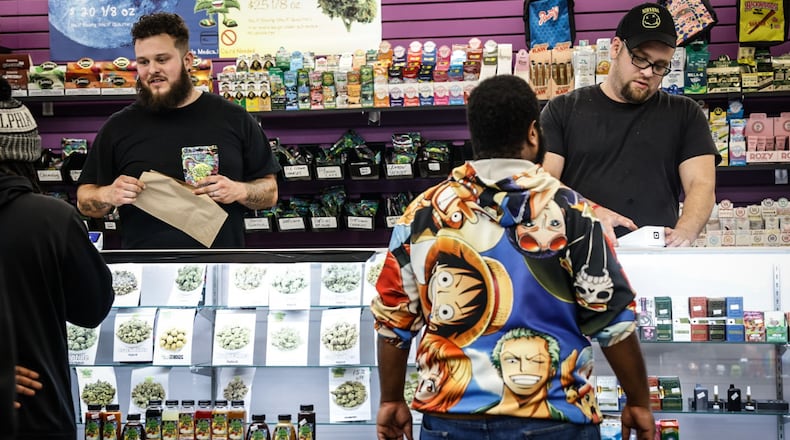The new law is set to go into effect on Dec. 7, and the state’s Division of Cannabis Control has nine months following that to set up the framework for the program.
Medical marijuana was legalized in Ohio several years ago, and the state’s medical dispensaries will be the first to receive licenses needed to legally sell recreational marijuana.
The initiated statute does not provide for any other licensing applications to be opened to the public initially, so it may take a couple of years for licenses to be offered to businesses. The Montgomery County Sheriff’s Office isn’t aware of any calls related to businesses selling recreational marijuana without a license following the passage of Issue 2, according to a spokesperson.
Credit: JIM NOELKER
Credit: JIM NOELKER
Multiple smoke shops in the area are weighing their options and trying to determine what impact Issue 2′s passage may have on their businesses.
Hamdan’s shop, located on Linden Avenue, sells smoking products and glass accessories, and like many other smoke shops and convenience stores, it also sells vape cartridges and candies that contain a substance called delta-8 that can produce a marijuana-like high.
These products, along with other members of the “delta” family, were made legal under the 2018 Farm Bill, which effectively legalized hemp and hemp-derived products on the federal level. Under that law, hemp is considered to have only 0.3% delta-9 THC.
Hamdan said the creation of the adult-use program may impact sales at shops that sell these products, but not substantially.
The business owner said people will likely continue using these types of smoking products over legal recreational marijuana for their lower price and ease of access. In addition, some people choose to use delta-8 over traditional marijuana because of the fear of reprimands at their workplaces.
Issue 2 included broad protections for Ohio employers regarding employee use and more.
The passage of Issue 2 was exciting to Trotwood smoke shop store manager Jake Flannagan as someone who said he benefited from the state’s medical marijuana program.
Flannagan said his store, now called Goldwasser Smoke and Vape but soon to be called Best Buds Depot, aims to continue selling what it’s selling — vapes, bud, edibles, juices, glassware and more — for as long as it can.
But the idea of obtaining a recreational license, once that time comes, is something the business is talking about with its lawyers, Flannagan said.
“A lot will need to happen before any business gets to that point,” he said.
Issue 2′s passage will permit Ohioans over the age of 21 to possess up to 2.5 ounces of marijuana in plant form or up to 15 grams in extract form and to grow up to six marijuana plants per adult (capped at 12 plants per household). But federally, marijuana remains illegal.
I-Smoke Fairborn manager Ribhy Ihrabi said he’s interested to see how the state’s adult use program develops and operates, but he’s not sure he’d want to move forward with seeking recreational marijuana licensing for his shop without it being legal on the federal level.
Ihrabi said he fears banking could become a headache for businesses trying to enter into the recreational marijuana industry.
“We’ll just have to wait and see,” he said.
About the Author


